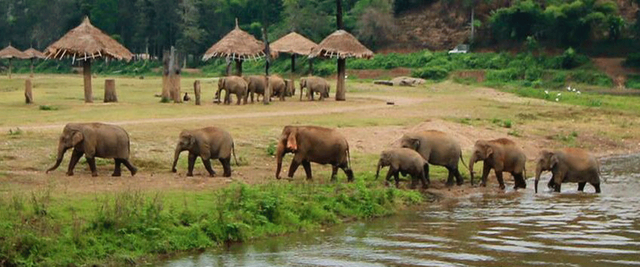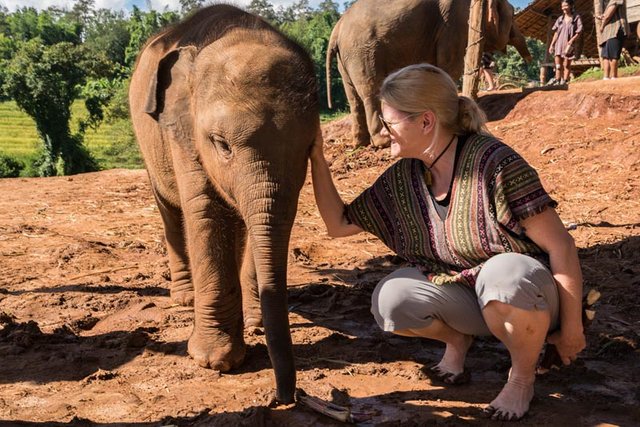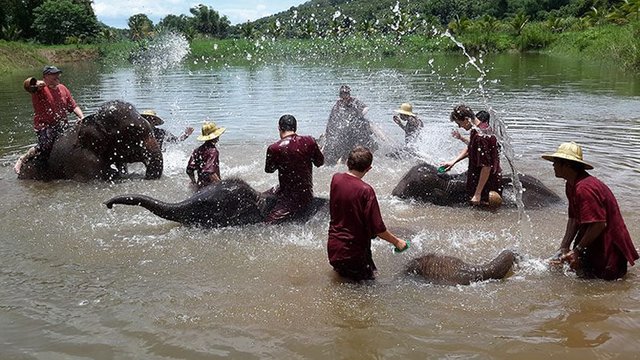When I first visited Thailand many years ago, the population, quite unabashedly promoted rather cruel tourism attractions that involved elephants. The guides (mahouts) would drive giant hooks into the side of the elephant's head in order to get it to follow instructions right in front of the guests. Younger elephants would be chained up to very short leashes in plain sight for everyone to see. For nearly everyone who attended, they left these attractions with a little bit of a feeling of shame for having participated in (and paid for) something that definitely promotes animal cruelty. I have to admit that I even did it once although at that time i was completely naive as to what went into the process.

source
It makes me very happy to say that in the past 5 years or so almost all of the cruel camps have disappeared and have been replaced by elephant sanctuaries or elephant rescue parks. These parks were initially funded by grants and donations and most of the owners are figuring out that these parks are actually MORE profitable than the cruel camps that existed in the past where the elephants were basically given almost zero freedom.
I wonder if this says something about humanity becoming kinder- I think it is probably more likely the result of social media and the ease of which information can be spread around the globe. Perhaps in the past the only way to truly know about the horrible things that were happening were to wait for National Geographic to publish articles about it and well, as great as that magazine is I only knew one person in my life that actually had a subscription.

source
These days people can go and simply hang out with the elephants in their massive parks. You can bathe them in the rivers, feed them various fruits that you can purchase (ps, elephants really love pineapple) pet them, or simply watch them from afar.
One of the favorite activities at the parks is to interact with the babies and to be honest it is very easy to understand why that is the case.

source
These parks will never allow anyone to ride on the elephants as this was the practice that started all the cruelty in the first place. There was a process of "breaking the animal's spirit" that was exceptionally cruel and had steps such as separating the young from their mothers at an early age, chaining them up for most of their lives, and beating them until they were terribly afraid to do anything other than what they were told. Trust me, an elephant definitely doesn't want you on their back and at these parks in Chiang Mai, no one is ever allowed to do that.
I think that almost anyone with a soul can agree that this is a magnificent change for the better as far as Thailand tourism is concerned and it can be almost entirely attributed to activists such as Projects Abroad who relentlessly pressed to change tourists' perception of this cruel practice rather than attempting to have it banned by the government (which was very unlikely to happen given the amount of money that was involved.)

source
It is wonderful to me that the free market and a shift in the public's opinion is something that inspired genuine change in the way these docile creatures are interacted with. Don't make any mistake here, domesticating these animals through cruel practices is NOT illegal in Thailand, but it just goes to show that if the monetary incentive is voluntarily removed from the equation by the consumers, the market sorts itself out and the business owners have no choice but to evolve.
I was speaking to a representative of Projects Abroad while I was writing this and he said "while it would be ideal for the elephant sanctuary's customers to have no interaction with the animals, this is a step in the right direction and we consider it a tremendous victory."
This is currently and consistently ranked as the number one attraction in Chiang Mai on multiple major review sites and for me anyway, especially since I have in-fact seen the cruel alternative, I believe it is wonderfully well-deserved. If you find yourself in Chiang Mai, you should definitely spend a day supporting these groups' initiatives so the ethical treatment of elephants for tourism can continue.
Links to the parks
https://www.elephantnaturepark.org/
https://elephantjunglesanctuary.com/
I am glad things have changed for the better. This was and still is a big money earner for the tourism industry. I wasn't aware of the hooks in the head etc and happy to hear that it has ended.
I visited an orphanage last year where most of their parents had been shot by poachers.The orphanage was more about the animals happiness and care to rehabilitate them back into the wild and only limited numbers are allowed to see them every day. They would end up back in game parks with no predators.
Downvoting a post can decrease pending rewards and make it less visible. Common reasons:
Submit
Thank you for posting this...very heartbreaking, inspiring and thought-provoking all at once. Also, it looks like a guy is riding the elephant in the last pic, in the water. Would love to hear your thoughts regarding the idea of humanity becoming kinder, if you ever felt inclined to write about that.
Downvoting a post can decrease pending rewards and make it less visible. Common reasons:
Submit
yeah, the dude is sitting on the elephant, you got that right. I didn't notice. However, this is a far cry from the trekking of days before when there was a giant saddle with massive wooden chairs on top of the guy and the only thing they did all day was carry people around and get stabbed in the side of the head with a giant hook as a method of telling them which way to go.
I will be happy when the practice entirely disappears - for now, most of them are already gone and those that are still around are not popular.
Downvoting a post can decrease pending rewards and make it less visible. Common reasons:
Submit
Thats amazing to see this big elephants very kind and swim
Downvoting a post can decrease pending rewards and make it less visible. Common reasons:
Submit
Oh. Gigantic elephant
Downvoting a post can decrease pending rewards and make it less visible. Common reasons:
Submit
Im really hoping that it is true, and also really hoping that we are becoming more kind
Downvoting a post can decrease pending rewards and make it less visible. Common reasons:
Submit
I just hope these animals are well-treated and well-fed.
Let's all preserved them so that the next generation can still see them.
Downvoting a post can decrease pending rewards and make it less visible. Common reasons:
Submit